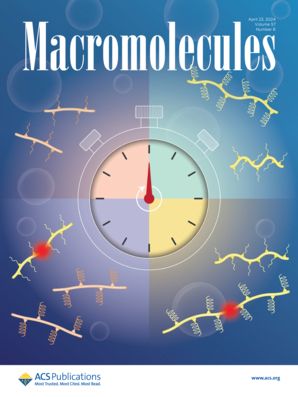Simultaneous Click Coupling Reaction and Declick Cyclization Reaction in the Synthesis of Degradable Polymers
IF 5.1
1区 化学
Q1 POLYMER SCIENCE
引用次数: 0
Abstract
The development of degradable polymers with desirable functionalities and chemical structures is a challenging goal in the field of polymer chemistry. Central to the challenge are the applications of new chemical reactions in the polymerization and degradation processes. In this research, a method based on a simultaneous click coupling reaction and declick cyclization reaction is applied in the synthesis of degradable polymers. Base-catalyzed thiol-phenylsulfone click reactions among small monomer molecules containing a phenylsulfonyl group and a thiol group on each structure lead to the growth of polymer chains. Meanwhile, thiolate anions generated at the ends of polymer chains have a nucleophilic substitution reaction with heteroaromatic thioethers in the backbones, leading to the degradation of the formed polymer chains and the generation of a cyclic compound. The chain growth and degradation processes can be tuned by controlling the concentrations of monomer and polymer chains. The click polymerization is dominant in the initial stage, and with an increase in polymer concentration, the declick reaction is dominant. The declick reaction and degradation of polymer chains are inhibited at a low temperature. Both click and declick reactions can be terminated by adding acids, and stable polymers are synthesized. Through a coupling reaction between the degradable homopolymer and pyridyl disulfide terminated poly(ethylene glycol) monomethyl ether, a degradable triblock copolymer is synthesized. Degradable diblock copolymers are synthesized by reversible addition–fragmentation chain transfer polymerizations using a degradable macro chain transfer agent.

可降解聚合物合成中的同时点击偶联反应和Declick环化反应
开发具有理想功能和化学结构的可降解聚合物是聚合物化学领域的一个具有挑战性的目标。挑战的核心是在聚合和降解过程中应用新的化学反应。本研究将咔嗒偶联反应与脱咔嗒环化反应同时进行的方法应用于可降解聚合物的合成。碱基催化的硫基-苯基砜在每个结构上含有一个苯基磺酰基和一个硫基的小单体分子之间的键合反应导致聚合物链的生长。同时,聚合物链末端生成的硫代阴离子与骨架上的杂芳香硫醚发生亲核取代反应,导致形成的聚合物链降解,生成环状化合物。链的生长和降解过程可以通过控制单体和聚合物链的浓度来调节。初始阶段以咔嗒反应为主,随着聚合物浓度的增加,以咔嗒反应为主。低温抑制了聚合物链的快速反应和降解。加入酸可以终止咔嗒反应和咔嗒反应,合成稳定的聚合物。通过可降解均聚物与端接吡啶二硫基聚乙二醇单甲醚的偶联反应,合成了可降解的三嵌段共聚物。采用可降解宏链转移剂,通过可逆加成-破碎链转移聚合合成了可降解二嵌段共聚物。
本文章由计算机程序翻译,如有差异,请以英文原文为准。
求助全文
约1分钟内获得全文
求助全文
来源期刊

Macromolecules
工程技术-高分子科学
CiteScore
9.30
自引率
16.40%
发文量
942
审稿时长
2 months
期刊介绍:
Macromolecules publishes original, fundamental, and impactful research on all aspects of polymer science. Topics of interest include synthesis (e.g., controlled polymerizations, polymerization catalysis, post polymerization modification, new monomer structures and polymer architectures, and polymerization mechanisms/kinetics analysis); phase behavior, thermodynamics, dynamic, and ordering/disordering phenomena (e.g., self-assembly, gelation, crystallization, solution/melt/solid-state characteristics); structure and properties (e.g., mechanical and rheological properties, surface/interfacial characteristics, electronic and transport properties); new state of the art characterization (e.g., spectroscopy, scattering, microscopy, rheology), simulation (e.g., Monte Carlo, molecular dynamics, multi-scale/coarse-grained modeling), and theoretical methods. Renewable/sustainable polymers, polymer networks, responsive polymers, electro-, magneto- and opto-active macromolecules, inorganic polymers, charge-transporting polymers (ion-containing, semiconducting, and conducting), nanostructured polymers, and polymer composites are also of interest. Typical papers published in Macromolecules showcase important and innovative concepts, experimental methods/observations, and theoretical/computational approaches that demonstrate a fundamental advance in the understanding of polymers.
 求助内容:
求助内容: 应助结果提醒方式:
应助结果提醒方式:


